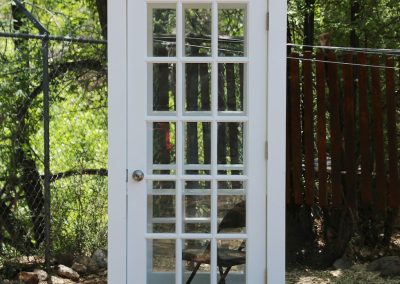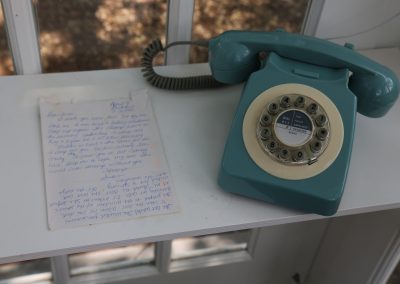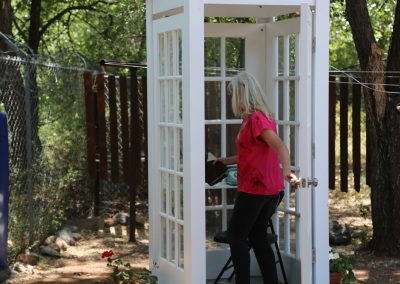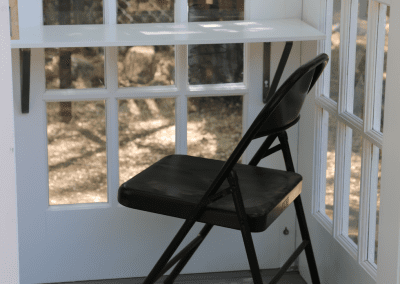The Lines Across Time Memory Booth was created to be a safe space for service members, veterans and their family members to anonymously share their feelings and leave messages for lost loved ones.
• Lines Across Times Debut Event Nov. 3 >
• Healing Arts IV Class >
Founded in 2017 by artist, Naomi Natale, the Lines Across Time Memory Booth project was inspired by a phone booth in Japan named the Telephone of the Wind.
In 2011, a devastating earthquake and tsunami struck Japan causing the small town of Otsuchi to lose almost everything. A year before this tragedy, a resident of Otsuchi named Itaru Sasaki situated an old phone booth in his garden as a way to muse over his cousin’s death. Longing to preserve a relationship with a departed loved one is a deeply relatable desire but can be a delicate proposition. “Because my thoughts couldn’t be relayed over a regular phone line,” Sasaki told the Japanese TV channel NHK Sendai. “I wanted them to be carried on the wind.”
The phone booth in Sasaki’s garden holds an old disconnected rotary phone, and since the tsunami has become a gathering place for people to recall loved ones lost. It now serves as a pilgrimage site of sorts where residents can come to work out painful feelings in a comfortable space.
The Lines Across Time Memory Booth opened in 2018 at the Museum of the American Military Family in Tijeras, New Mexico, and is serving communities throughout the state. The Memory Booth provides active-duty military members, veterans, and their families a way to process the often painful memories that might arise from military service.
The premise of the Memory Booth is to provide an opportunity for people to “call” someone and “talk” to them, even if they are not physically connected through an operating telephone line. Those who use it can decide to record and archive their conversation, or to have a personal experience within the booth.
In 2018 a mobile version of the booth was built so that we could bring the Memory Booth into different communities and facilities across the state. With this mobile booth, we have been able to collaborate with different groups and facilities to offer a variety of programming designed for specific communities’ needs.
In the Spring of 2019, we collaborated with EL CENTRO de Igualdad y Derechos, a grassroots immigrants’ rights and workers’ justice organization, to share the Memory Booth with their staff and community.
In the Spring of 2020, we collaborated with Crossroads for Women, a nonprofit that provides housing and therapeutic services to women emerging from incarceration, to design an eight-week program utilizing the Memory Booth as a catalyst for dialogue, creative expression, and community building. The program will bring together a group of women from the Crossroads community once a week to engage in dialogue and creative encounters relevant to their individual experiences interacting with the booth.
If you are interested in using the Lines Across Time Memory Booth or would like to explore a collaboration with us please contact: Naomi Natale, Project Director at: nnatale@unm.edu
The booth is currently located at the Museum of the American Military Family
546B Hwy 333 (Historic Route 66)
Tijeras, NM 87059.
The museum is open Saturday and Sunday 12:30-6:00pm.
For more information about this project, to schedule a private group gathering or to inquire about having the mobile memory booth at an event please contact:
Project Director: Naomi Natale at nnatale@theartofrevolution.org
Clinical Services
Healing Arts and Creative Encounters for patients and families, as well as staff and providers at The University of New Mexico Hospitals
Education
Healing Arts Certificate Program for undergraduate and graduate students, healthcare professionals, and the community-at-large. One of the six courses offered is an optional study abroad course in southern Africa
Research
Various projects to evaluate the program as a whole as well as specific interventions for specific populations
Community Outreach
Projects to promote and develop arts and health initiatives in local and regional community organizations and healthcare facilities
International Collaboration
Work with various international organizations and universities to promote and develop arts and healthcare programming in other countries; several projects currently underway in southern Africa






